CARLOS MUREITHI
Updated Mon, November 20, 2023
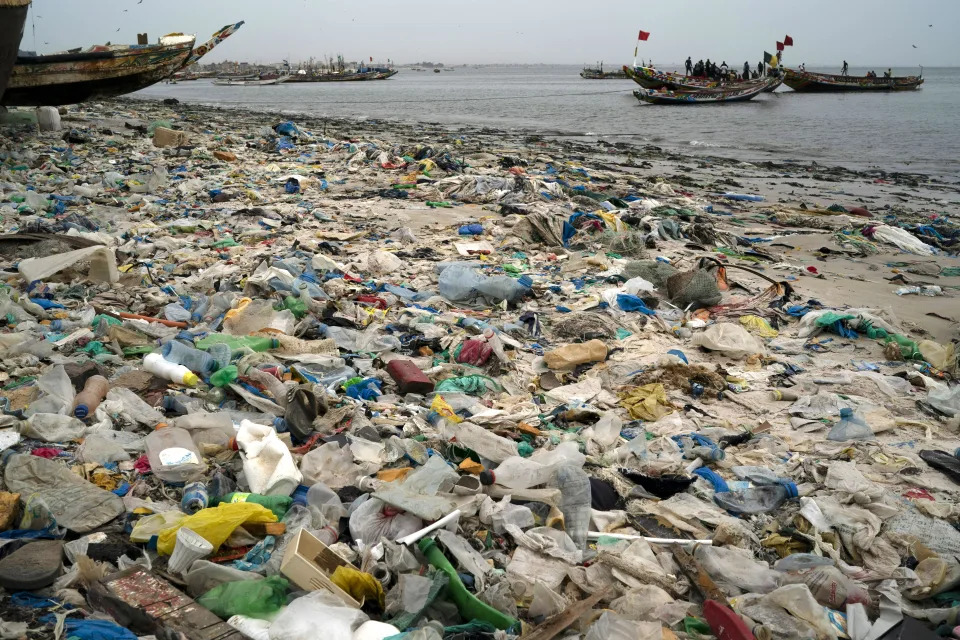
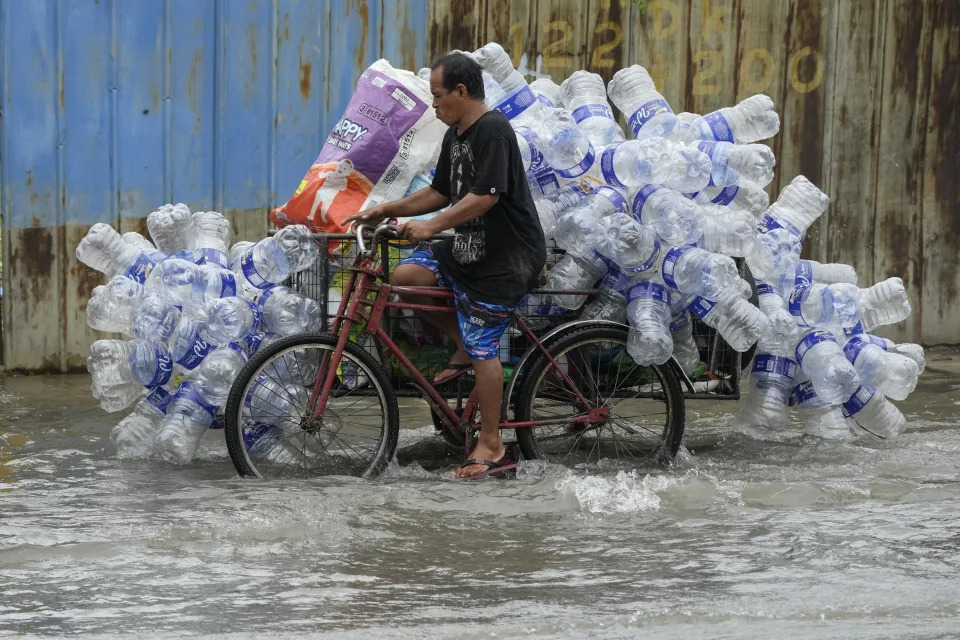
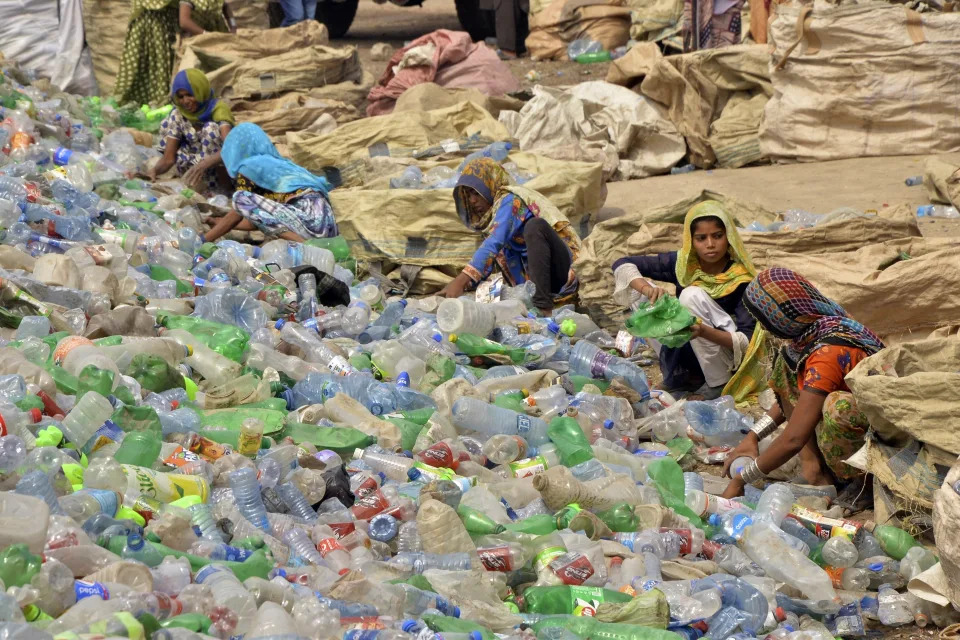
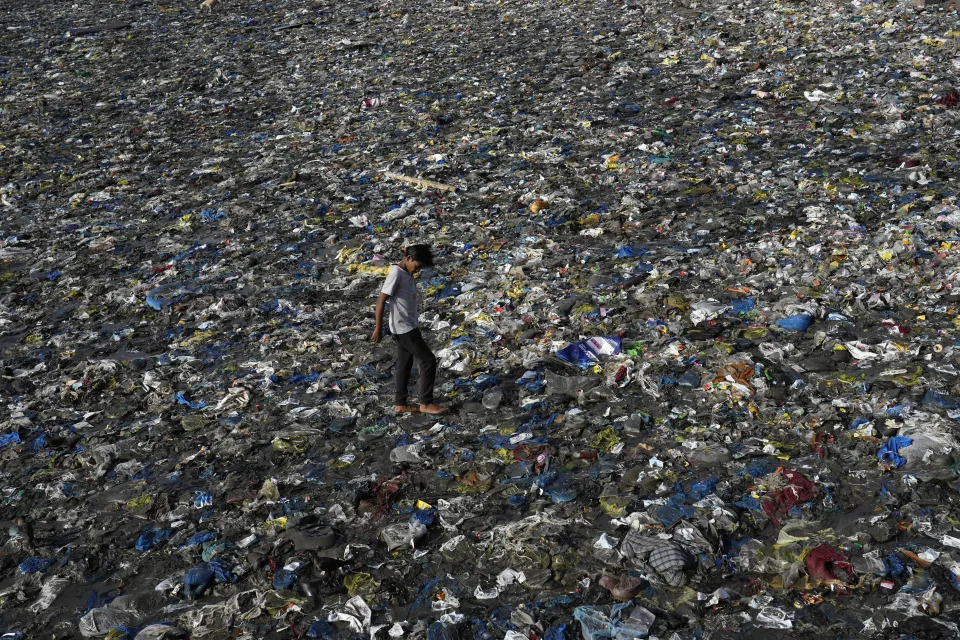
A boy walks on the plastic waste at the Badhwar Park beach on the Arabian Sea coast on World Environment Day in Mumbai, India, June 5, 2023. Negotiators at UN-led talks in Nairobi have failed to agree on how to advance work towards the development of a global treaty to end plastic pollution. Environmental advocates say some oil-producing governments used stalling tactics designed to ultimately weaken the treaty.
(AP Photo/Rajanish Kakade, File)
NAIROBI, Kenya (AP) — The latest round of negotiations to craft a treaty to end global plastic pollution closed late on Sunday after talks in Nairobi, Kenya, where delegates failed to reach a consensus on how to advance a draft of the agreement after a week of strained negotiations.
Environmental advocates criticized the outcome of the weeklong United Nations-led meeting on plastic pollution, saying oil-producing countries successfully employed stalling tactics designed to weaken the agreement.
The Intergovernmental Negotiating Committee for Plastics is mandated with creating the first international, legally binding treaty on plastic pollution in five rounds of negotiations.
At this third round of talks, delegates were expected to discuss a draft published in September that represented the views from the first two meetings and narrow down options.
Member states decided to move forward with a revision of the draft, which has become longer due to new proposals during this round and will be even more difficult to advance, participants said. States also failed to reach a consensus on intersessional work to discuss crucial parts of the draft ahead of the fourth round of negotiations.
But at the close of the session, outgoing negotiation chair Gustavo Adolfo Meza-Cuadra Velasquez described the round as “a significant step forward.” He noted, however, that “much remains to be done both in narrowing down our differences and in developing technical work to inform our negotiations.”
Throughout the week, delegates suggested options to strengthen proposed global rules across the entire lifecycle of plastic from production to disposal. A coalition of “high-ambition” governments led by Rwanda and Norway hope to eradicate plastic pollution by 2040 by having a treaty that guarantees interventions throughout the whole life cycle of plastics, including reducing output and restricting some chemicals used in the plastics industry.
But some oil-producing countries advocated for shifting previously agreed mandates of the agreement, like changing the focus from the entire lifecycle of plastic to waste management, and having voluntary measures at national levels to fight plastic pollution, instead of global measures.
Environmentalists disagree.
“The science is very clear, the data is very clear, and the moral imperative is very clear," said Graham Forbes, global plastics campaign lead at Greenpeace. "You cannot solve the plastic pollution crisis if you do not massively cut plastic production."
Ana Lê Rocha, director of the global plastics program at the Global Alliance for Incinerator Alternatives, said “the bullies of the negotiations pushed their way through, despite the majority countries, with leadership from the African Bloc and other nations in the Global South, in support of an ambitious treaty.”
But Stewart Harris, a spokesperson of the International Council of Chemical Associations, sees an opportunity for the treaty to accelerate circularity, or the reuse of plastics. He hoped the agreement will set up “something like a requirement for governments to establish circularity targets as part of their national action plans.”
The world produces more than 430 million tons of plastic annually, and two thirds of that are products that are disposed of soon after use, becoming waste and, often getting into the human food chain, according to the United Nations. Global plastic waste is expected to nearly triple by 2060, according to the Organization for Economic Cooperation and Development. Plastics are often made from oil, or other planet-warming fossil fuels.
More than 1,900 participants from 161 countries, including government officials, representatives of intergovernmental organizations, and civil society members, took part in the talks. A total of 143 lobbyists registered for the negotiations, according to an analysis by the Center for International Environmental Law.
Tadesse Amera, co-chair of the International Pollutants Elimination Network, worried that lobbyists could “divert science from independent science to industry-based science” and “prevent the treaty from protecting human health in the environment.”
This week’s talks were the third of five rounds. The next talks will take place in Ottawa, Canada in April 2024. Delegates have until the end of 2024 to produce a final draft.
Jacob Kean-Hammerson, an ocean campaigner at the Environmental Investigation Agency, described the remaining path to create the treaty as “treacherous.”
“These negotiations ended with more questions than answers about how we can bridge the political divide and craft a treaty that stimulates positive change," he said.
Forbes, who led Greenpeace’s delegation at the talks, said the stakes will be higher in the coming negotiation rounds.
“We are charging towards catastrophe,” he said. “We have one year to turn this around, and to ensure that we are celebrating our collective success instead of dooming ourselves to a dark and dangerous future.”
___
Associated Press climate and environmental coverage receives support from several private foundations. See more about AP’s climate initiative here. The AP is solely responsible for all content.
U.N. plastic treaty talks grapple with re-use, recycle, reduce debate
NAIROBI, Kenya (AP) — The latest round of negotiations to craft a treaty to end global plastic pollution closed late on Sunday after talks in Nairobi, Kenya, where delegates failed to reach a consensus on how to advance a draft of the agreement after a week of strained negotiations.
Environmental advocates criticized the outcome of the weeklong United Nations-led meeting on plastic pollution, saying oil-producing countries successfully employed stalling tactics designed to weaken the agreement.
The Intergovernmental Negotiating Committee for Plastics is mandated with creating the first international, legally binding treaty on plastic pollution in five rounds of negotiations.
At this third round of talks, delegates were expected to discuss a draft published in September that represented the views from the first two meetings and narrow down options.
Member states decided to move forward with a revision of the draft, which has become longer due to new proposals during this round and will be even more difficult to advance, participants said. States also failed to reach a consensus on intersessional work to discuss crucial parts of the draft ahead of the fourth round of negotiations.
But at the close of the session, outgoing negotiation chair Gustavo Adolfo Meza-Cuadra Velasquez described the round as “a significant step forward.” He noted, however, that “much remains to be done both in narrowing down our differences and in developing technical work to inform our negotiations.”
Throughout the week, delegates suggested options to strengthen proposed global rules across the entire lifecycle of plastic from production to disposal. A coalition of “high-ambition” governments led by Rwanda and Norway hope to eradicate plastic pollution by 2040 by having a treaty that guarantees interventions throughout the whole life cycle of plastics, including reducing output and restricting some chemicals used in the plastics industry.
But some oil-producing countries advocated for shifting previously agreed mandates of the agreement, like changing the focus from the entire lifecycle of plastic to waste management, and having voluntary measures at national levels to fight plastic pollution, instead of global measures.
Environmentalists disagree.
“The science is very clear, the data is very clear, and the moral imperative is very clear," said Graham Forbes, global plastics campaign lead at Greenpeace. "You cannot solve the plastic pollution crisis if you do not massively cut plastic production."
Ana Lê Rocha, director of the global plastics program at the Global Alliance for Incinerator Alternatives, said “the bullies of the negotiations pushed their way through, despite the majority countries, with leadership from the African Bloc and other nations in the Global South, in support of an ambitious treaty.”
But Stewart Harris, a spokesperson of the International Council of Chemical Associations, sees an opportunity for the treaty to accelerate circularity, or the reuse of plastics. He hoped the agreement will set up “something like a requirement for governments to establish circularity targets as part of their national action plans.”
The world produces more than 430 million tons of plastic annually, and two thirds of that are products that are disposed of soon after use, becoming waste and, often getting into the human food chain, according to the United Nations. Global plastic waste is expected to nearly triple by 2060, according to the Organization for Economic Cooperation and Development. Plastics are often made from oil, or other planet-warming fossil fuels.
More than 1,900 participants from 161 countries, including government officials, representatives of intergovernmental organizations, and civil society members, took part in the talks. A total of 143 lobbyists registered for the negotiations, according to an analysis by the Center for International Environmental Law.
Tadesse Amera, co-chair of the International Pollutants Elimination Network, worried that lobbyists could “divert science from independent science to industry-based science” and “prevent the treaty from protecting human health in the environment.”
This week’s talks were the third of five rounds. The next talks will take place in Ottawa, Canada in April 2024. Delegates have until the end of 2024 to produce a final draft.
Jacob Kean-Hammerson, an ocean campaigner at the Environmental Investigation Agency, described the remaining path to create the treaty as “treacherous.”
“These negotiations ended with more questions than answers about how we can bridge the political divide and craft a treaty that stimulates positive change," he said.
Forbes, who led Greenpeace’s delegation at the talks, said the stakes will be higher in the coming negotiation rounds.
“We are charging towards catastrophe,” he said. “We have one year to turn this around, and to ensure that we are celebrating our collective success instead of dooming ourselves to a dark and dangerous future.”
___
Associated Press climate and environmental coverage receives support from several private foundations. See more about AP’s climate initiative here. The AP is solely responsible for all content.
U.N. plastic treaty talks grapple with re-use, recycle, reduce debate
Duncan Miriri
Updated Sun, November 19, 2023
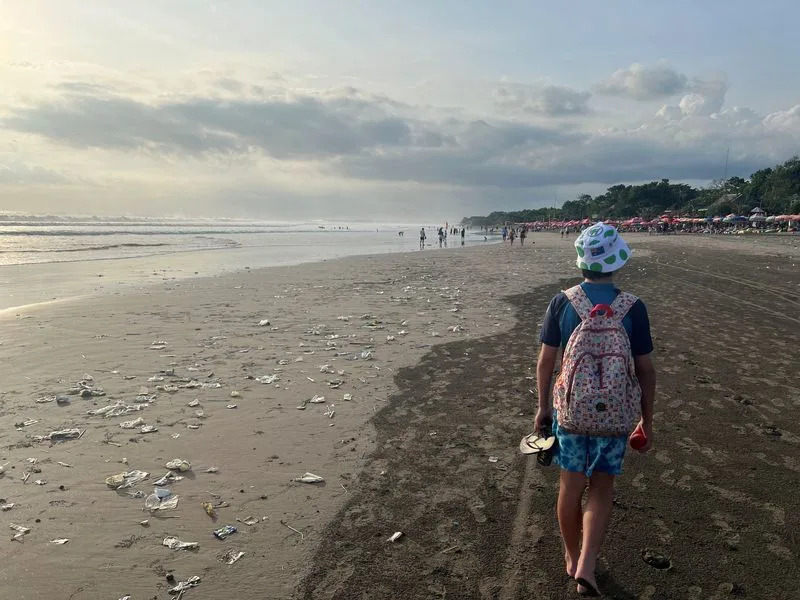
A boy walks on a beach polluted by plastic trash in Bali
NAIROBI (Reuters) -A third round of United Nations negotiations to try to deliver the world's first treaty to control plastic pollution has drawn more than 500 proposals from governments, participants said on Sunday.
Negotiators, who spent a week meeting in the Kenyan capital at talks known as INC3, have until the end of next year to strike a deal for the control of plastics, which produce an estimated 400 million tonnes of waste every year.
The plastics industry, oil and petrochemical exporters, including Russia and Saudi Arabia, have said a global deal should promote recycling and re-use of plastic, but environmental campaigners and some governments say much less needs to be produced in the first place.
Environmental group Greenpeace said a successful deal would require the United States and the European Union to show greater leadership than they have so far.
"The hard truth is that INC3 has failed to deliver on its core objective: delivering a mandate to prepare a first draft of a treaty text," Graham Forbes, head of delegation for Greenpeace, said.
"This is not progress. This is chaos," he said referring to the number of submissions.
Two more rounds of talks will take place next year to try to finalise the deal. A proposal to hold an extra session before the next round in Canada, known as intersessional talks, failed to advance in the final plenary meeting, participants said.
Bethanie Carney Almroth, an eco-toxicologist at the University of Gothenburg in Sweden, who was involved in the talks, said the world was confronting a huge challenge.
"Plastics are connected to climate change, to biodiversity loss and other major threats and crises that we as the human population are facing on the planet," she said.
There was no immediate comment from the United Nations.
LESS THAN 10% OF PLASTIC WASTE RECYCLED
Stewart Harris, a spokesman for the International Council of Chemicals Association, an industry body that favours measures like re-using plastic containers as opposed to production curbs, said the Nairobi talks had delivered good ideas.
A proposal by Switzerland and Uruguay to hold more discussions on curbing harmful polymers and chemicals of concern garnered support from more than 100 members states.
But some participants were disappointed by what they called the lack of a clear path towards an effective deal.
"Major fossil fuel producers and exporters stalled efforts to move forward in an efficient manner," said Tadesse Amera, co-chair of the International Pollutants Elimination Network (IPEN), a global network of non-governmental organisations.
Less than 10% of plastic waste is recycled, the U.N. Environment Programme says, while at least 14 million tonnes end up in oceans every year, the International Union for Conservation of Nature says.
Canada, Kenya, and the European Union were among those who said plastic production needed to be limited, while a coalition of Russia, Saudi Arabia and others has sought to emphasise recycling.
Members of the Saudi delegation at the talks declined to talk to Reuters, while Russian delegates could not immediately be reached for comment.
(Reporting by Duncan Miriri; Editing by George Obulutsa and Barbara Lewis)
Frustration as latest talks on global plastic treaty close
Nick PERRY and Dylan GAMBA
Sun, November 19, 2023
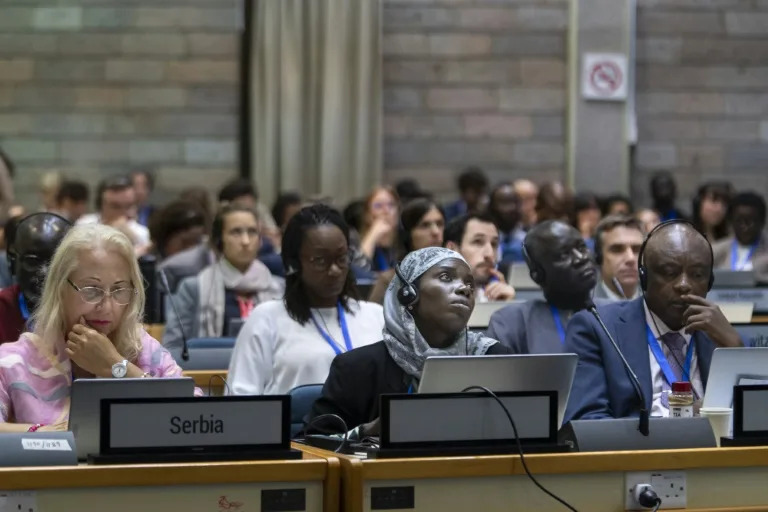
Delegates at the final day of the Intergovernmental Negotiating Committee on Plastic Pollution meeting in Nairobi on Sunday (Tony KARUMBA)
The latest negotiations toward a global plastic treaty concluded late Sunday with disagreement about how the pact should work and frustration from environment groups over delays and lack of progress.
Negotiators spent a week at the UN Environment Programme (UNEP) headquarters in Nairobi haggling over a draft treaty to tackle the growing problem of plastic pollution found everywhere from ocean depths to mountaintops to human blood.
It is the third time negotiators have met since 175 nations pledged early last year to fast-track talks in the hope of finalising a treaty by 2024.
The meeting in Nairobi was supposed to advance the process by fine-tuning the draft treaty and starting discussions about what concrete measures should target pollution from plastic, which is made from fossil fuels.
But the treaty specifics were never really addressed, with a small number of oil-producing nations -– particularly Iran, Saudi Arabia and Russia –- accused of employing stalling tactics seen at previous negotiation rounds to hinder progress.
"Unsurprisingly, certain countries are blocking progress on every term, playing obstruction and procedural manoeuvres," Carroll Muffett from the Center for International Environmental Law told AFP.
- Lacking leadership -
In closed-door meetings, so many new proposals were put forward that the text -- instead of being revised and streamlined -- ballooned in size over the course of the week, according to observers following the talks.
Graham Forbes from Greenpeace said the meeting had "failed" its objectives and urged governments to take a harder line in future negotiations on nations not acting in good faith.
"A successful treaty is still within reach but it will require a level of leadership and courage from big, more ambitious countries that we simply have not seen yet," he told AFP.
There was anger directed at UNEP, with the civil society alliance group GAIA accusing the hosts of overseeing "an undisciplined and meandering" meeting that allowed a minority to hold proceedings "hostage".
UNEP said "substantial" progress had been made by nearly 2,000 delegates in attendance.
The International Council of Chemical Associations, the main industry group for global petrochemical and plastic companies, said the process had improved an "underwhelming" draft and jostling between governments was critical for treaty building.
"We (now) have a document -- a draft text -- that is much more inclusive of the range of ideas," spokesman Stewart Harris told AFP.
The plastics meeting comes just before crucial climate talks in the oil-rich United Arab Emirates later this month that are set to be dominated by debate over the future of fossil fuels.
Global demand for plastic has seen production double in 20 years and at current rates, it could triple by 2060 without action, according to the OECD.
Ninety percent of plastic is not recycled, with most dumped in nature or improperly burned.
Environment groups have long argued that without curbs on the manufacturing of new plastic any treaty would be weak.
- Behind schedule -
Around 60 "high ambition" nations have called for a treaty that eliminates some plastic products through bans and phase outs, and enshrines rules to reduce plastic production and consumption.
But in Nairobi, some nations expressed reluctance to support cuts on plastic production, a concern recognised by the incoming chair of the negotiation committee.
"We are not here to end all plastic, we are here to end plastic pollution," Ecuador's Luis Vayas Valdivieso told delegates after his election on Sunday.
Divisions also sharpened over whether treaty terms should be legally binding or voluntary.
Eirik Lindebjerg from the World Wide Fund for Nature said despite frustrations the process had not been derailed, and a majority of countries still supported a strong treaty.
"I wouldn't call the meeting a failure. We are behind schedule, but we are not off track," he told AFP.
There are two final rounds of negotiations in 2024: the first in Canada in April, and a second in South Korea in November, with the goal of adopting a treaty by mid-2025.
np-dyg/bp
Plastics treaty talks yield 'chaos': Greenpeace
Reuters Videos
Mon, November 20, 2023
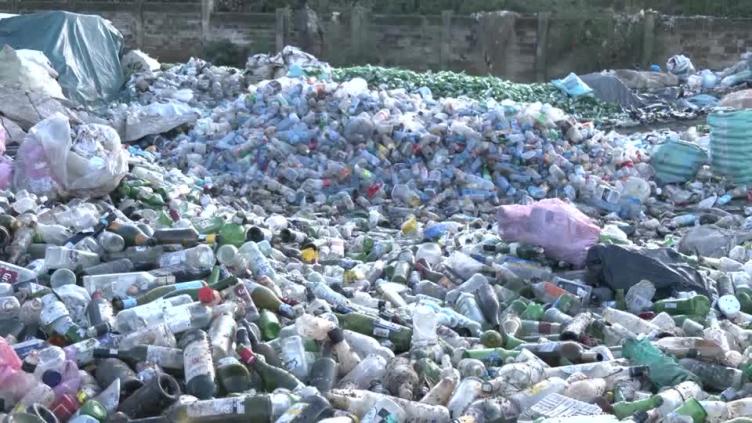
STORY: Talks aimed at delivering the world's first treaty to control plastic pollution have drawn more than 500 proposals from governments, participants said on Sunday (November 20).
Negotiators, who have spent a week at U.N. talks in Kenya's capital Nairobi, have until the end of next year to strike a deal.
But the number of submissions was described as "not progress" but "chaos" by the head of Greenpeace's delegation, Graham Forbes.
"We are talking in circles and pandering to a few countries that are not negotiating in good faith and all the while the fossil fuel industry is expanding plastic production at the expense of our climate, biodiversity and human health.”
Plastic produces an estimated 400 million metric tonnes of waste each year.
But how the plastics treaty should tackle this waste has been a cause for debate.
Environmental campaigners and some governments argue that you'll get less waste if you produce less plastic in the first place.
But the plastics industry, perhaps unsurprisingly, doesn't agree.
Nor do oil and petrochemical exporters like Russia and Saudi Arabia.
They say a global deal should promote recycling and re-use.
Stewart Harris of the International Council of Chemicals Association said the Nairobi talks had delivered good ideas.
"We now have in the document a wide range of views that will carry forward into INC4, and at INC4, that’s where we expect governments to start to narrow down and identify areas of consensus."
Campaigners said major fossil fuel producers and exporters had stalled efforts to make meaningful progress.
Less than 10% of plastic waste is recycled, the U.N. Environment Programme says, and at least 14 million metric tonnes is estimated to end up in oceans every year.
Two more rounds of talks will take place next year to try to finalize the deal.
No comments:
Post a Comment